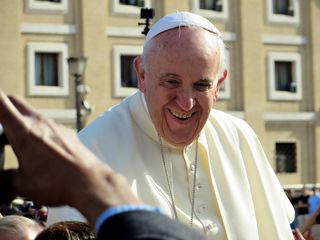
Laughter
Does the Pope Laugh Too Much?
Wim Wenders and wisdom from psychology on laughter and self-knowledge.
Posted May 23, 2018

In a current documentary, the Pope says that people need to learn to laugh more. Is that true?
Laughing at yourself is very old advice from personality psychology. Allport was probably the first person to mention it, in 1937 (although he may have borrowed it from G. K. Chesterton). Allport said that laughing is one of the three signs of a mature personality. I doubt the Pope would have read Allport, so let me quickly re-outline Allport's view on laughter and then compare it to the Pope's view.
Allport said our personalities are largely useful but sometimes absurd. For example, it's often useful to be cautious, but sometimes that can lead us to never making decisions. Allport said that knowing ourselves enough to laugh at ourselves makes us more human. We become more human because we learn that our personality is not the only way to see the world. In other words, we make ourselves less the center of the world and become part of a community, all by laughing at ourselves.
Pope Francis laughs a lot. Here are some times he laughed:
1. When a baby was dressed like him
2. When the wind blew off his hat
3. When someone drew a bad picture of him
4. After he told a series of mother-in-law jokes
The Pope says there are two helpful reasons for laughter. First, it defeats self-importance. Second, laughter can build community. The Pope says "to laugh in community and not at the community or at others." Allport, talking about personal development, was mainly focusing on the first of Francis' two types.
There may be even more types of helpful laughter (e.g. slapstick), and there are certainly lots of types of destructive and/or divisive laughter, but laughing at oneself and with others remain two helpful activities for the mature personality. And it seems, to me, given the types of evidence above, that the Pope laughs in a way that helps himself and helps him to help others.
References
Allport, G. W. (1937). Personality: a psychological interpretation. Oxford, England: Holt.
Wenders, W. (2018). Pope Francis: A Man Of His Word. Focus Features.

